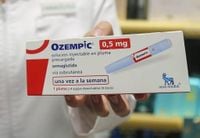On Wednesday, April 16, 2025, the National Health Surveillance Agency (Anvisa) announced a significant regulatory change regarding the sale of weight-loss pens, including popular medications like Ozempic, Saxenda, and Wegovy. Under the new rules, pharmacies across Brazil will be required to retain medical prescriptions when these medications are sold. This decision, made unanimously by Anvisa's directors, aims to curb the indiscriminate use of these drugs, which have increasingly been obtained without proper medical supervision.
Prior to this ruling, consumers were only required to present a doctor's prescription at the point of sale. However, with the new regulation, individuals will now need to hand over one copy of their prescription to the pharmacy, similar to the existing requirements for antibiotics. The prescriptions must be valid for up to 90 days from the date of issue and should contain two copies, with pharmacies also mandated to register the documents in the National System for the Management of Controlled Products (SNGPC).
Anvisa's decision comes in response to alarming data indicating a rise in adverse events linked to the misuse of these medications. According to Anvisa, 32% of adverse event notifications in Brazil pertain to the use of these drugs in ways not indicated on their packaging—more than three times the global average of 10%. This trend has raised concerns about the safety and efficacy of these treatments, especially given that they are often used off-label for weight loss rather than their original purpose of treating type 2 diabetes.
Rômison Rodrigues Mota, the acting president of Anvisa, emphasized the importance of this measure during the agency's board meeting. He stated, "The retention of prescriptions is necessary to increase control over the use of these medications and protect public health from the irrational consumption of slimming drugs." The agency's concerns are underscored by findings from the Vigimed notification system, which revealed a significantly higher number of adverse events related to the inappropriate use of these medications compared to global statistics.
The new rules aim to enhance oversight of these drugs and ensure that patients who genuinely need them for chronic conditions can access them safely. Medical societies have largely supported this initiative, highlighting the need for regulating the use of these medications while preserving access for patients with serious health issues. They point out that obesity should be treated as a chronic disease that requires careful and personalized management.
However, not everyone agrees with Anvisa's approach. The Pharmaceutical Industry Association of Research (Interfarma) criticized the decision, arguing that it fails to address the root causes of the problem. They assert that merely retaining prescriptions will not solve the growing issue of an illegal market for these medications, which includes the importation and manipulation of active ingredients without quality assurance. Interfarma advocates for a comprehensive strategy to combat this underground market, including stricter regulations and enhanced border controls.
In December, the Brazilian Society of Obesity and Metabolic Syndrome (Abeso) expressed concern over the situation, reiterating the necessity of medical supervision for these treatments. They warned that irregular purchases for self-medication pose significant health risks and can hinder access for patients who truly need these medications.
The weight-loss pens, such as Ozempic and Wegovy, are GLP-1 analogues that affect appetite control, glucose metabolism, and body weight regulation. Originally approved for treating type 2 diabetes, these drugs have proven effective for significant weight reduction in individuals with obesity. Recent studies have also suggested additional health benefits, including protection against cardiovascular and kidney diseases, further fueling the demand for these treatments.
Despite the new regulations, the practice of off-label use—prescribing medications for purposes not explicitly stated in their package inserts—remains legal. This allows healthcare professionals to use their discretion in prescribing these medications when they believe the benefits outweigh the risks for specific patients.
The Anvisa ruling will take effect 60 days after its official publication in the Official Gazette of the Union. This decision is seen as a crucial step in protecting public health amid growing concerns about the misuse of weight-loss medications.
As the regulatory landscape continues to evolve, the balance between patient access and safety remains a pressing issue. Stakeholders in the healthcare community are closely watching how these changes will impact both the availability of these vital medications and the potential risks associated with their misuse.
In conclusion, the new regulations by Anvisa reflect a growing recognition of the need for stricter controls over medications that have become widely popular for weight loss but are often misused. As the agency works to protect public health, it is essential for all parties involved to collaborate in addressing the challenges posed by the illegal market and ensuring that patients receive the care they need responsibly and effectively.




